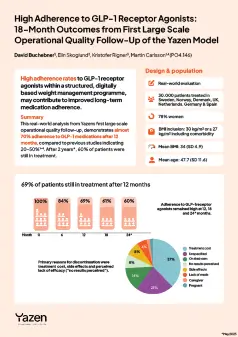High Adherence to GLP-1 Receptor Agonists: 18-Month Outcomes from the Yazen Model
High adherence rates to GLP-1 receptor agonists within a structured, digitally based weight management programme, may contribute to improved long-term medication adherence.
Summary
This real-world analysis from Yazens first large scale operational quality follow-up, demonstrates almost 70% compliance with GLP-1 medications at 12 months, surpassing earlier studies that showed 20-50%1-4. After 2 years*, 60% of patients were still in treatment.
.webp)

High Adherence to GLP-1 Receptor Agonists: 18-Month Outcomes from the First Large Scale Operational Quality Follow-Up of the Yazen Model
David Buchebner1, Elin Skoglund2, Kristofer Rigner3, Martin Carlsson1,4 (PO4.146)
1-3. Yazen Health AB, Malmö, Sweden
4. Department of Medicine and Optometry, eHealth Institute, Linnaeus University, Kalmar, Sweden
INTRODUCTION
Glucagon-like peptide-1 (GLP-1) receptor agonists and GLP-1/glucose-dependent insulinotropic polypeptide (GIP) receptor agonists have demonstrated efficacy in achieving and maintaining weight loss. However, real-world adherence to these medications beyond the short term remains a concern, with previous studies indicating adherence rates between 20% and 50% after 12 months1-4.
OBJECTIVE
In this quality follow-up, adherence to GLP-1 receptor agonists was evaluated at 6, 12, and 18 months in patients receiving these medications within a comprehensive, digitally delivered weight management programme incorporating both medical treatment and intensive lifestyle intervention.
METHOD
Data from a quality follow-up of Swedish patients (n=25,824) at specified time points was analysed. The Yazen Model combines physician-led medication management with personalised lifestyle coaching delivered by registered nurses, dietitians, or physiotherapists specialising in obesity care. Mandatory psychological support is provided for individuals with dysfunctional eating behaviours or eating disorders. Reasons for treatment discontinuation were captured through patient questionnaires.
RESULT
Adherence to GLP-1 receptor agonists was 84% at 6 months. Importantly, adherence remained high at 12 months (69%) and 18 months (61%).
.webp)
The primary reason for discontinuation was treatment cost (37%). Side effects and perceived lack of efficacy (“no results perceived”) each accounted for 8% of discontinuations. Unspecified reasons and self-directed weight maintenance attempts (“on their own”) comprised 21% and 14% of discontinuations, respectively.

CONCLUSION
This real-world analysis demonstrates high adherence rates to GLP-1 receptor agonists within a structured, digitally based weight management programme. These findings suggest that integrated lifestyle intervention and readily accessible support from physicians and coaches may contribute to improved long-term medication adherence. Further research is warranted to evaluate the impact of this intervention model on patient outcomes.
Conflict of Interest: David Buchebner, Elin Skoglund, Kristofer Rigner are all employees of Yazen Health. Martin Carlsson is a co-founder and employee of Yazen Health, but also holds an academic position as Associate Professor at Linnaeus University.
- Gleason et al. 2024. Real-world persistence and adherence to glucagon-like peptide-1 receptor agonists among obese commercially insured adults without diabetes. JMCP. 30:8, 860-867. https://doi.org/10.18553/jmcp.2024.23332
- Do et al. 2024. GLP-1 Receptor Agonist Discontinuation Among Patients With Obesity and/or Type 2 Diabetes. JAMA Network Open. 7(5):e2413172. https://doi:10.1001/jamanetworkopen.2024.13172
- Rodriguez et al. 2024. Discontinuation and Reinitiation of GLP-1 Receptor Agonists Among US Adults with Overweight or Obesity. medRxiv 24311058. https://doi:10.1001/jamanetworkopen.2024.57349
- Gasoyan et al. 2024. Early- and later-stage persistence with antiobesity medications: A retrospective cohort study. Obesity (Silver Spring). 32:486–493. https://doi.org/10.1002/oby.23952
* May 2025
November 4, 2025



.svg)
.webp)





